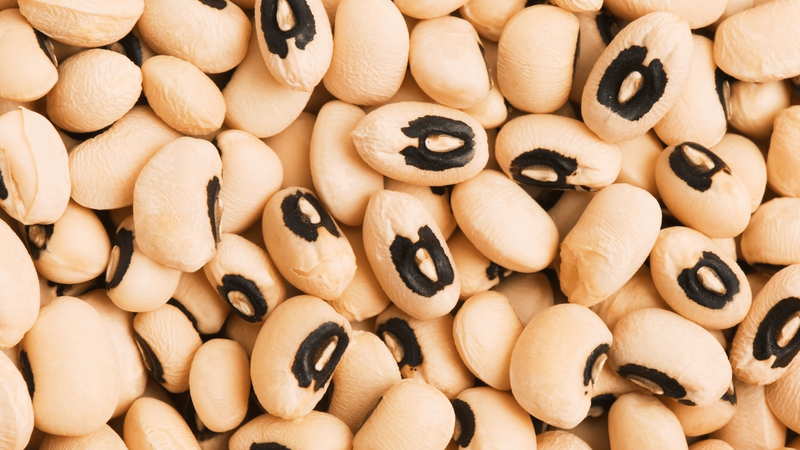Black-eyed peas, a familiar bean in many family kitchens, are not only an ingredient for rustic dishes but also contain many surprising health benefits. Let’s explore the benefits of black-eyed peas through the article below.
Black-eyed peas are rich in nutritional value and have long been used in a healthy diet. With protein, fiber and many essential vitamins and minerals, black-eyed peas not only support overall health but also bring many special benefits to the digestive system, cardiovascular system and skin.
What are black-eyed peas?
Black-eyed peas, also known as small white beans, are a type of bean that belongs to the legume family and is popular in the culinary and folk medicine of many countries. This type of bean is easily recognized by its unique feature: A small black ring around the navel of the bean, which looks like an “eye”.
Black-eyed peas are not only a delicious food source, but also contain many essential nutrients such as protein, fiber, B vitamins, iron and potassium. With a slightly sweet, soft and fatty taste, this type of bean is often used to cook soup, dessert or prepare healthy dishes, bringing many health benefits and suitable for everyone.

Black eyed peas are a food that contains high nutritional content.
What are the benefits of black-eyed peas?
Helps control blood sugar levels
Black-eyed peas are a great choice for people with diabetes, especially type 1 and type 2 diabetes. The slow absorption properties of this bean help prevent sudden spikes in blood sugar levels, while reducing sugar cravings. In addition, black-eyed peas also help improve insulin and fat levels, helping to control blood sugar levels effectively.
Improve skin, hair and nail health
Thanks to their rich protein content, black-eyed peas not only support muscle development but also help improve skin, nail and hair health. The protein in beans helps repair cells and promote tissue regeneration, giving a youthful and vibrant appearance.
Improve eyesight
Vitamin A in black-eyed peas plays an important role in protecting and improving eyesight. This vitamin helps create necessary pigments in the retina, helping the eyes adapt better to low light conditions. The vitamin A content in black-eyed peas is even higher than some vegetables such as broccoli or spinach.
Promotes healthy digestion
Black-eyed peas are high in fiber, which helps improve the digestive system by promoting regular bowel movements and preventing constipation. In addition, this bean also helps clean up cholesterol accumulated in the small and large intestines, thereby reducing the risk of diseases such as atherosclerosis or heart attack.
Supports weight loss
With a high fiber content, black-eyed peas help create a feeling of fullness for a long time, preventing overeating. This is an ideal food for those who are in the process of losing weight, both maintaining energy and effectively controlling weight.

Black eyed peas are an ideal food for those who intend to lose weight.
Prevents anemia
A rich source of iron and folate, black-eyed peas help increase the production of red blood cells and hemoglobin, helping to improve anemia.
Promotes cardiovascular health
Black-eyed peas are high in potassium and low in fat, helping to maintain stable blood pressure and prevent cholesterol buildup in the arteries. This is an ideal food for a healthy diet, helping to reduce the risk of cardiovascular disease.
Helps prevent pancreatic cancer
Folate in black-eyed peas plays a role in preventing the growth of cancer cells, especially pancreatic cancer. According to research, adequate folate supplementation can reduce the risk of this disease by up to 60%.
Slows down the aging process
The combination of vitamin A and other nutrients in black-eyed peas helps maintain body health, minimizing premature aging.

Vitamin A and other nutrients in black-eyed peas help prevent aging.
Things to note when eating black-eyed peas you need to know
To use black-eyed peas effectively and scientifically, you need to clearly understand the benefits as well as the notes when adding them to your daily diet. Here are some notes when eating black-eyed peas that you need to know:
- Do not eat too much: The high fiber content in beans can increase the burden on the digestive system, especially in people with sensitive digestive tracts.
- Soak and cook thoroughly: Black-eyed peas contain some anti-nutritional compounds, such as phytate and lectin, which can hinder mineral absorption or cause indigestion. To reduce these substances, you should soak the beans for 6-8 hours before cooking, then cook them thoroughly.
- Consider for people with gout: People with gout or at risk of this disease should limit the use of black-eyed peas to avoid aggravating symptoms.
- Combined with a balanced diet: Black-eyed peas cannot provide all the nutrients the body needs. Therefore, combine this bean with other food sources such as green vegetables, fruits, animal or plant proteins to ensure balanced nutrition.

You should combine eating beans with a balanced diet to maintain a balanced figure.
With high fiber content, rich in protein and many vitamins and minerals, black-eyed peas are a great choice for health-conscious people. Add black-eyed peas to your daily menu scientifically to fully enjoy the nutritional value that this food brings.





